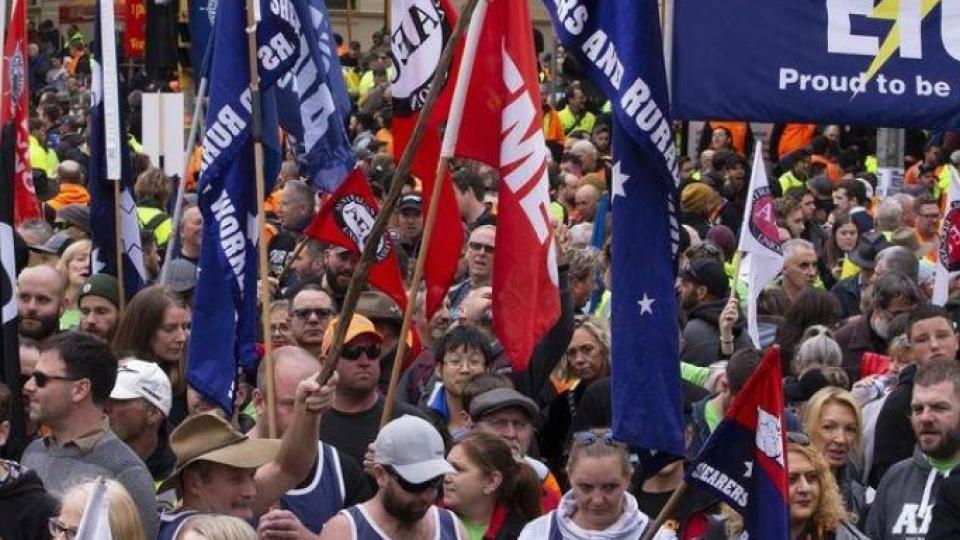ACTU Jobs Plan – Let's not squander it

Several days before Federal Treasurer Josh Frydenberg waxed lyrical about the good old days of early neoliberalism under Ronald Reagan and Margaret Thatcher, the Australian Council of Trade Unions launched its under-reported National Economic Reconstruction plan.
The plan includes a comprehensive analysis of the pandemic-induced economic crisis, and its lead up over the past two decades. It presents far-reaching progressive measures to stimulate economic growth, for 1 million jobs, equity and environmental sustainability.
Specifically, it calls for:
- Free, publicly funded, quality childcare;
- Free TAFE and for federal and state investment to be redirected to TAFE;
- to expand the JobKeeper wage subsidy to include arts and entertainment workers;
- a National Reconstruction Investment Plan, including a government investment boost; and
- a sustainable manufacturing strategy, including incentives for high-energy users to transition rapidly to using renewable energy.
It is a plan that anyone on the left should endorse and fight for.
Its central premise, developed with the help of the Centre For Future Work, is that with a federal funding boost to the public sector 1 million new jobs could be created and growth would be stimulated.
The “jobs-led economic reconstruction” is styled on Keynesian economics, deployed by most Western countries to rebuild after World War II. Today however, this has been superseded by neoliberalism, first championed by Thatcher and Reagan, and adopted by social democratic governments including here. It has been responsible for mass privatisations, casualised work forces and wages’ stagnation.
Today, we can clearly see how insecure casualised workforces are helping spread the coronavirus in aged-care facilities and security companies used for quarantine hotels.
Why the corporate media has ignored the ACTU plan is obvious, but the silence from the union movement is more complex.
The Australian Financial Review on July 24 summed up the Coalition and business responses to the ACTU’s jobs plan, insisting that the only role for it in boosting the post COVID-19 economy will be to deliver “reforms” to enterprise bargaining and to simplify awards.
David Marin-Guzman quoted Australian Industry Group chief executive Innes Willox as saying that it is “heartening to see the Treasurer endorse the need for industrial relations reform and the continuation of increased but balanced flexibility provisions for the foreseeable future”.
Business as usual for the government and industry bosses amounts to more sackings and attacks on the rights of organised labour.
So, can the ACTU win its jobs plan?
Certainly, pleas for government to do the right thing will only fall on deaf ears. Plans like these need to be fought for: governments are not going to simply hand over millions of dollars and big and medium sized companies will not stand by while their profit margins are reduced.
Western governments believe that any reserves they can get their hands on need to be allocated to bailing out business rather than earmarked for long-term rebuilding schemes with no electoral or short-term profit gains. It was the same during 2008 Global Financial Crisis when governments used billions of taxpayer funds to bail out the problem banks.
The ACTU plan needs to be widely endorsed by all unions. They need to commit to a campaign that workers want to fight for. This should be straight forward, but it is being made difficult because of the divisions between unions.
First, there is a schism between the Construction, Forestry, Mining and Energy Union (Construction Division) and ACTU Secretary Sally McManus and President Michele O’Neil. It began after they called on CFMEU Construction Division Victorian Secretary John Setka to stand down after he was found guilty of harassing his wife. This has also led to fights where the CFMEU Construction division in Victoria has been accused of poaching union members from the Manufacturing Division of the CFMEU (O’Neil’s former division) and the Australian Services Union.
Secondly, there are a number of unions and workers who will not be happy at the plan’s emphasis on environmental sustainability. These would include other CFMEU divisions covering timber workers and miners, as well as the Australian Workers Union which wants any revitalisation of manufacturing powered by fossil gas.
Significantly, outgoing Australian Manufacturing Workers Union national secretary Paul Bastian supports the sustainable manufacturing strategy outlined by the ACTU. He is co-hosting a webinar on this with Jim Stanford from the Centre for Future Work on July 28.
Surprisingly, the Labor Party has said nothing about the plan. Perhaps that is because, if it was elected as the alternative government, it would be pressured to implement at least parts of it.
The other problem is that the unions are split between factions that are regularly engaging in pitched battles. The most recent of these is between the Industrial Left faction (once united behind Adem Somyurek and including the AWU, CFMEU and the Rail, Tram and Bus Union Victorian branch) and the Socialist Left faction. The Socialist Left involves most other progressive unions and Victorian Premier Daniel Andrews.
These two factions have come to blows in pre-selection battles and branch stacking allegations, two manifestations of the problem facing the labour movement. As a result of the intervention of Labor’s National Executive, any pretence of democracy in the Victorian Labor Party has been abandoned as the whole division has been handed to administrators for the next three years.
Most of these internal disputes have nothing to do with the everyday struggles facing workers and union members. In fact, most view the factional divisions as unnecessary distractions, while they face a precarious future as the pandemic drags on.
The only way to win a national jobs plan like the ACTU’s is if the unions fight for it together. This has to become a priority.
[Sue Bull is a long-time unionist and member of the Geelong Socialist Alliance.]